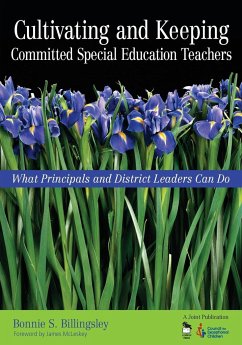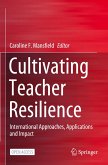Bonnie S. Billingsley
Cultivating and Keeping Committed Special Education Teachers
What Principals and District Leaders Can Do
Bonnie S. Billingsley
Cultivating and Keeping Committed Special Education Teachers
What Principals and District Leaders Can Do
- Broschiertes Buch
- Merkliste
- Auf die Merkliste
- Bewerten Bewerten
- Teilen
- Produkt teilen
- Produkterinnerung
- Produkterinnerung
Billingsley highlights the problems that drive many special educators out of teaching and outlines practical recommendations that leaders can use to increase retention.
Andere Kunden interessierten sich auch für
![Cultivating and Keeping Committed Special Education Teachers Cultivating and Keeping Committed Special Education Teachers]() Bonnie S. BillingsleyCultivating and Keeping Committed Special Education Teachers95,99 €
Bonnie S. BillingsleyCultivating and Keeping Committed Special Education Teachers95,99 €![Cultivating Leadership in Early Childhood Education and Care Cultivating Leadership in Early Childhood Education and Care]() Leanne GibbsCultivating Leadership in Early Childhood Education and Care201,99 €
Leanne GibbsCultivating Leadership in Early Childhood Education and Care201,99 €![The efficacy of Keeping a Portfolio for Boosting Writing Skills The efficacy of Keeping a Portfolio for Boosting Writing Skills]() Mehmet Veysi Babayi_gi_tThe efficacy of Keeping a Portfolio for Boosting Writing Skills43,99 €
Mehmet Veysi Babayi_gi_tThe efficacy of Keeping a Portfolio for Boosting Writing Skills43,99 €![Cultivating Teacher Resilience Cultivating Teacher Resilience]() Cultivating Teacher Resilience37,99 €
Cultivating Teacher Resilience37,99 €![Cultivating Lifelong Learners through Revitalized TLE and TVL Programs Cultivating Lifelong Learners through Revitalized TLE and TVL Programs]() Marlon CaigCultivating Lifelong Learners through Revitalized TLE and TVL Programs32,99 €
Marlon CaigCultivating Lifelong Learners through Revitalized TLE and TVL Programs32,99 €![Cultivating the Confucian Individual Cultivating the Confucian Individual]() Canglong WangCultivating the Confucian Individual103,99 €
Canglong WangCultivating the Confucian Individual103,99 €![Keeping and Improving Today's School Leaders Keeping and Improving Today's School Leaders]() Bruce S. CooperKeeping and Improving Today's School Leaders114,99 €
Bruce S. CooperKeeping and Improving Today's School Leaders114,99 €-
-
-
Billingsley highlights the problems that drive many special educators out of teaching and outlines practical recommendations that leaders can use to increase retention.
Hinweis: Dieser Artikel kann nur an eine deutsche Lieferadresse ausgeliefert werden.
Hinweis: Dieser Artikel kann nur an eine deutsche Lieferadresse ausgeliefert werden.
Produktdetails
- Produktdetails
- Verlag: Corwin
- Seitenzahl: 264
- Erscheinungstermin: 10. März 2005
- Englisch
- Abmessung: 254mm x 178mm x 14mm
- Gewicht: 503g
- ISBN-13: 9781412908887
- ISBN-10: 1412908884
- Artikelnr.: 22381265
- Herstellerkennzeichnung
- Books on Demand GmbH
- In de Tarpen 42
- 22848 Norderstedt
- info@bod.de
- 040 53433511
- Verlag: Corwin
- Seitenzahl: 264
- Erscheinungstermin: 10. März 2005
- Englisch
- Abmessung: 254mm x 178mm x 14mm
- Gewicht: 503g
- ISBN-13: 9781412908887
- ISBN-10: 1412908884
- Artikelnr.: 22381265
- Herstellerkennzeichnung
- Books on Demand GmbH
- In de Tarpen 42
- 22848 Norderstedt
- info@bod.de
- 040 53433511
Dr. Bonnie S. Billingsley is faculty member in the Department of Teaching and Learning at Virginia Tech. She has taught a range of courses over the last fifteen years in the areas of learning disabilities, emotional disorders, and the administration and supervision of special education. Dr. Billingsley began her career in special education teaching students with disabilities in both Tallahassee and St. Augustine, Florida. She also served as district supervisor of special education in both St. Augustine, Florida and in Roanoke City, Virginia. Dr. Billingsley's research interests are in the preparation, support, and retention of special education teachers. Her interests in retention are focused on workplace conditions and the induction of new teachers. Dr. Billingsley has published numerous articles in leading journals on special education teacher retention, teacher support, and the needs of beginning special education teachers. She has served as a consultant in the area of special education teacher retention to various professional organizations, school systems, state departments of education, research groups, and universities and has been an invited speaker as various conferences.
List of Figures List of Contributors Dedication Foreword - James McLeskey Preface Acknowledgements About the Author Part I: Understanding Teacher Attrition and Retention 1. Introduction: A Leader
s Framework for Teacher Retention Chapter Overview The Leadership Framework Types of Attrition: A District and School Perspective Chapter Summary 2. Why Special Educators Leave and Why It Matters Scenario: Two Perspectives on Attrition Chapter Overview Why Special Educators Leave Special Educators
Plans to Leave Why Attrition Matters Chapter Summary Selected Readings Websites Part II. Finding and Cultivating High Quality Special Educators 3. Recruiting and Hiring Highly Qualified Special Educators Scenario: "Where are the Qualified Applicants?" Chapter Overview Recruiting Special Education Teachers Effective Hiring and Assignment Practices Tips for Leaders Chapter Summary Selected Readings Websites 4. Supporting New Teachers Through Responsive Induction Scenario: How We Eat Our Young Chapter Overview Reasons New Teachers Struggle Induction Goals and Planning Key Components of Induction Programs Summary Selected Readings Websites 5. Designing Effective Professional Development Scenario: Unclear Boundaries Chapter Overview Involve Teachers in Assessing Needs and Planning Goals Use Effective Professional Development Practices Clarify Leader Roles in Professional Development Developing University-School Partnerships for Professional Development Enhancing Experienced Teachers
Professional Growth Tips for Leaders Summary Selected Readings Websites Part III. Creating Positive Work Environments 6. Creating Inclusive and Collaborative Schools Scenario: What a Difference a Principal Can Make Chapter Overview Eight Leadership Tasks for Inclusive and Collaborative Schools Tips for Leaders Summary Selected Readings Websites 7. Designing Reasonable Work Assignments Scenario: "I Wanted to Teach Kids" Chapter Overview Four Types of Role Problems Designing Reasonable Assignments for Special Education Teachers Tips for Leaders Summary Selected Readings Websites 8. Promoting Wellness by Reducing Stress Scenario: "Where
s the Joy?" Chapter Overview Symptoms of Teacher Stress and Burnout Contributors to Stress and Burnout Assessing Stress and Burnout Strategies to Reduce Stress Tips for Leaders Understand Local Stressors Affecting Special Educators Summary Selected Readings Websites 9. Strategic Planning for Teacher Quality and Retention Scenario: Learning From Teachers Chapter Overview Key Questions for Understanding and Improving Retention Strategic Planning for Retention Summary Selected Readings Websites Part IV. Resources A. Principal Support Questionnaire B. Teacher Stress Inventory C.Teacher Exit Interview D. Teacher Follow-up Exit Questionnaire E. Teacher Workforce Survey F. Focus Group Interviews References Feedback Form Index
s Framework for Teacher Retention Chapter Overview The Leadership Framework Types of Attrition: A District and School Perspective Chapter Summary 2. Why Special Educators Leave and Why It Matters Scenario: Two Perspectives on Attrition Chapter Overview Why Special Educators Leave Special Educators
Plans to Leave Why Attrition Matters Chapter Summary Selected Readings Websites Part II. Finding and Cultivating High Quality Special Educators 3. Recruiting and Hiring Highly Qualified Special Educators Scenario: "Where are the Qualified Applicants?" Chapter Overview Recruiting Special Education Teachers Effective Hiring and Assignment Practices Tips for Leaders Chapter Summary Selected Readings Websites 4. Supporting New Teachers Through Responsive Induction Scenario: How We Eat Our Young Chapter Overview Reasons New Teachers Struggle Induction Goals and Planning Key Components of Induction Programs Summary Selected Readings Websites 5. Designing Effective Professional Development Scenario: Unclear Boundaries Chapter Overview Involve Teachers in Assessing Needs and Planning Goals Use Effective Professional Development Practices Clarify Leader Roles in Professional Development Developing University-School Partnerships for Professional Development Enhancing Experienced Teachers
Professional Growth Tips for Leaders Summary Selected Readings Websites Part III. Creating Positive Work Environments 6. Creating Inclusive and Collaborative Schools Scenario: What a Difference a Principal Can Make Chapter Overview Eight Leadership Tasks for Inclusive and Collaborative Schools Tips for Leaders Summary Selected Readings Websites 7. Designing Reasonable Work Assignments Scenario: "I Wanted to Teach Kids" Chapter Overview Four Types of Role Problems Designing Reasonable Assignments for Special Education Teachers Tips for Leaders Summary Selected Readings Websites 8. Promoting Wellness by Reducing Stress Scenario: "Where
s the Joy?" Chapter Overview Symptoms of Teacher Stress and Burnout Contributors to Stress and Burnout Assessing Stress and Burnout Strategies to Reduce Stress Tips for Leaders Understand Local Stressors Affecting Special Educators Summary Selected Readings Websites 9. Strategic Planning for Teacher Quality and Retention Scenario: Learning From Teachers Chapter Overview Key Questions for Understanding and Improving Retention Strategic Planning for Retention Summary Selected Readings Websites Part IV. Resources A. Principal Support Questionnaire B. Teacher Stress Inventory C.Teacher Exit Interview D. Teacher Follow-up Exit Questionnaire E. Teacher Workforce Survey F. Focus Group Interviews References Feedback Form Index
List of Figures List of Contributors Dedication Foreword - James McLeskey Preface Acknowledgements About the Author Part I: Understanding Teacher Attrition and Retention 1. Introduction: A Leader
s Framework for Teacher Retention Chapter Overview The Leadership Framework Types of Attrition: A District and School Perspective Chapter Summary 2. Why Special Educators Leave and Why It Matters Scenario: Two Perspectives on Attrition Chapter Overview Why Special Educators Leave Special Educators
Plans to Leave Why Attrition Matters Chapter Summary Selected Readings Websites Part II. Finding and Cultivating High Quality Special Educators 3. Recruiting and Hiring Highly Qualified Special Educators Scenario: "Where are the Qualified Applicants?" Chapter Overview Recruiting Special Education Teachers Effective Hiring and Assignment Practices Tips for Leaders Chapter Summary Selected Readings Websites 4. Supporting New Teachers Through Responsive Induction Scenario: How We Eat Our Young Chapter Overview Reasons New Teachers Struggle Induction Goals and Planning Key Components of Induction Programs Summary Selected Readings Websites 5. Designing Effective Professional Development Scenario: Unclear Boundaries Chapter Overview Involve Teachers in Assessing Needs and Planning Goals Use Effective Professional Development Practices Clarify Leader Roles in Professional Development Developing University-School Partnerships for Professional Development Enhancing Experienced Teachers
Professional Growth Tips for Leaders Summary Selected Readings Websites Part III. Creating Positive Work Environments 6. Creating Inclusive and Collaborative Schools Scenario: What a Difference a Principal Can Make Chapter Overview Eight Leadership Tasks for Inclusive and Collaborative Schools Tips for Leaders Summary Selected Readings Websites 7. Designing Reasonable Work Assignments Scenario: "I Wanted to Teach Kids" Chapter Overview Four Types of Role Problems Designing Reasonable Assignments for Special Education Teachers Tips for Leaders Summary Selected Readings Websites 8. Promoting Wellness by Reducing Stress Scenario: "Where
s the Joy?" Chapter Overview Symptoms of Teacher Stress and Burnout Contributors to Stress and Burnout Assessing Stress and Burnout Strategies to Reduce Stress Tips for Leaders Understand Local Stressors Affecting Special Educators Summary Selected Readings Websites 9. Strategic Planning for Teacher Quality and Retention Scenario: Learning From Teachers Chapter Overview Key Questions for Understanding and Improving Retention Strategic Planning for Retention Summary Selected Readings Websites Part IV. Resources A. Principal Support Questionnaire B. Teacher Stress Inventory C.Teacher Exit Interview D. Teacher Follow-up Exit Questionnaire E. Teacher Workforce Survey F. Focus Group Interviews References Feedback Form Index
s Framework for Teacher Retention Chapter Overview The Leadership Framework Types of Attrition: A District and School Perspective Chapter Summary 2. Why Special Educators Leave and Why It Matters Scenario: Two Perspectives on Attrition Chapter Overview Why Special Educators Leave Special Educators
Plans to Leave Why Attrition Matters Chapter Summary Selected Readings Websites Part II. Finding and Cultivating High Quality Special Educators 3. Recruiting and Hiring Highly Qualified Special Educators Scenario: "Where are the Qualified Applicants?" Chapter Overview Recruiting Special Education Teachers Effective Hiring and Assignment Practices Tips for Leaders Chapter Summary Selected Readings Websites 4. Supporting New Teachers Through Responsive Induction Scenario: How We Eat Our Young Chapter Overview Reasons New Teachers Struggle Induction Goals and Planning Key Components of Induction Programs Summary Selected Readings Websites 5. Designing Effective Professional Development Scenario: Unclear Boundaries Chapter Overview Involve Teachers in Assessing Needs and Planning Goals Use Effective Professional Development Practices Clarify Leader Roles in Professional Development Developing University-School Partnerships for Professional Development Enhancing Experienced Teachers
Professional Growth Tips for Leaders Summary Selected Readings Websites Part III. Creating Positive Work Environments 6. Creating Inclusive and Collaborative Schools Scenario: What a Difference a Principal Can Make Chapter Overview Eight Leadership Tasks for Inclusive and Collaborative Schools Tips for Leaders Summary Selected Readings Websites 7. Designing Reasonable Work Assignments Scenario: "I Wanted to Teach Kids" Chapter Overview Four Types of Role Problems Designing Reasonable Assignments for Special Education Teachers Tips for Leaders Summary Selected Readings Websites 8. Promoting Wellness by Reducing Stress Scenario: "Where
s the Joy?" Chapter Overview Symptoms of Teacher Stress and Burnout Contributors to Stress and Burnout Assessing Stress and Burnout Strategies to Reduce Stress Tips for Leaders Understand Local Stressors Affecting Special Educators Summary Selected Readings Websites 9. Strategic Planning for Teacher Quality and Retention Scenario: Learning From Teachers Chapter Overview Key Questions for Understanding and Improving Retention Strategic Planning for Retention Summary Selected Readings Websites Part IV. Resources A. Principal Support Questionnaire B. Teacher Stress Inventory C.Teacher Exit Interview D. Teacher Follow-up Exit Questionnaire E. Teacher Workforce Survey F. Focus Group Interviews References Feedback Form Index








